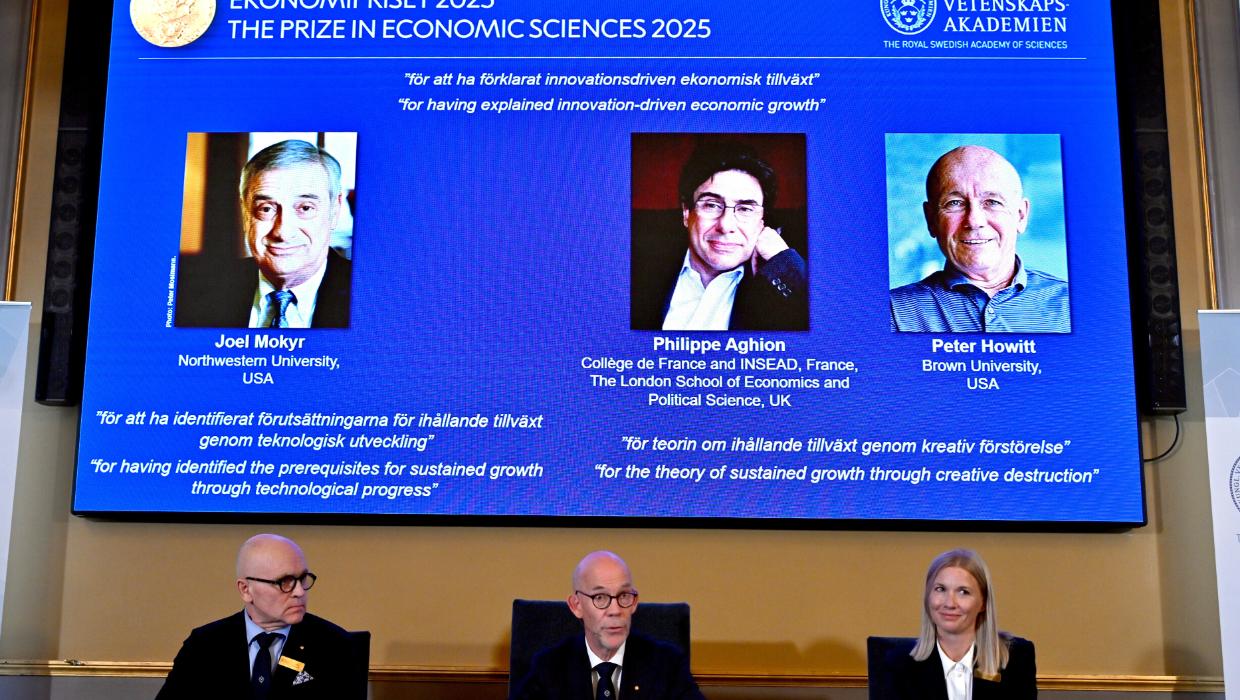Science
Nobel Prize in Economics Awarded for Insights on Creative Destruction

Three distinguished economists were awarded the Nobel Memorial Prize in Economic Sciences on March 15, 2024, for their groundbreaking research into business innovation and its role in economic growth. The prize was shared by Dutch-born Joel Mokyr, 79, from Northwestern University; Philippe Aghion, 69, associated with the Collège de France and the London School of Economics; and Canadian-born Peter Howitt, 79, from Brown University. Their work has provided valuable insights into the process of “creative destruction,” a term that describes how new innovations replace older technologies and businesses.
The Nobel committee recognized the trio for enhancing the understanding of how new products and inventions can drive economic development and improve human welfare, even as they render established companies obsolete. Their findings are particularly relevant in today’s rapidly changing technological landscape, where the rise of e-commerce has significantly impacted traditional retail.
Understanding Creative Destruction
The concept of creative destruction, long associated with economist Joseph Schumpeter, refers to the dynamic process through which innovation leads to the decline of outdated industries. Schumpeter emphasized this phenomenon in his 1942 work, “Capitalism, Socialism and Democracy,” describing it as “the essential fact about capitalism.” The Nobel laureates extended this foundational idea, with Mokyr emphasizing the need for scientific explanations to understand why innovations succeed.
Aghion and Howitt contributed to this discourse by developing a complex mathematical model in 1992 that examined the underlying mechanisms facilitating sustained economic growth. Their research highlighted the challenges posed by market monopolies, suggesting that a lack of competition can stifle innovation, particularly in sectors like telecommunications and social media.
John Hassler, chair of the Nobel committee, stated, “The laureates’ work shows that economic growth cannot be taken for granted. We must uphold the mechanisms that underlie creative destruction, so that we do not fall back into stagnation.” This underscores the importance of fostering an environment that encourages innovation while also supporting workers affected by such changes.
Implications for Future Innovation
The impact of innovation on job markets is a critical aspect of the laureates’ research. While new technologies may lead to job losses, Mokyr and his peers argue that they also create unforeseen opportunities. Mokyr, known for his optimistic view of technological advancement, pointed to the challenges economists face in measuring the impact of innovations like music streaming services, which have transformed the industry despite their low visibility in economic data.
Aghion’s recent comments on the importance of artificial intelligence (AI) reflect the growing conversation around technological advancements. He noted that while AI presents significant growth potential, its benefits depend on the policies and institutions governing its use. Aghion warned that current major players might deter new entrants, stressing the need for regulations that promote competition.
Mokyr expressed a more positive outlook on AI, dismissing fears of technological unemployment as exaggerated. He argued that rather than displacing workers, new technologies often lead to more engaging and challenging job opportunities.
The economic implications of these findings resonate deeply in Europe, where a report by former European Central Bank head Mario Draghi highlighted a widening productivity gap with the United States in digital innovation. Aghion emphasized the urgency for Europe to enhance its research capabilities and venture capital investments to remain competitive.
The Nobel prize awarded to Mokyr, Aghion, and Howitt comprises half of the total prize of 11 million Swedish kronor (approximately $2.02 million), with the other half to be shared between Aghion and Howitt. Recipients also receive an 18-carat gold medal and a diploma in recognition of their achievements.
As the world grapples with the implications of rapid technological change, the work of these three economists offers critical insights into the processes that drive economic evolution and societal progress. Their research not only celebrates the legacy of innovation but also underscores the importance of adaptability in a shifting economic landscape.
-

 World4 months ago
World4 months agoTest Your Knowledge: Take the Herald’s Afternoon Quiz Today
-

 Sports5 months ago
Sports5 months agoPM Faces Backlash from Fans During Netball Trophy Ceremony
-

 Lifestyle5 months ago
Lifestyle5 months agoDunedin Designers Win Top Award at Hokonui Fashion Event
-

 Entertainment5 months ago
Entertainment5 months agoExperience the Excitement of ‘Chief of War’ in Oʻahu
-

 Sports5 months ago
Sports5 months agoLiam Lawson Launches New Era for Racing Bulls with Strong Start
-

 World5 months ago
World5 months agoCoalition Forms to Preserve Māori Wards in Hawke’s Bay
-

 Health5 months ago
Health5 months agoWalking Faster Offers Major Health Benefits for Older Adults
-

 Lifestyle5 months ago
Lifestyle5 months agoDisney Fan Reveals Dress Code Tips for Park Visitors
-

 Top Stories2 weeks ago
Top Stories2 weeks agoTongan Star Eli Katoa Shares Recovery Update After Surgery
-

 Politics5 months ago
Politics5 months agoScots Rally with Humor and Music to Protest Trump’s Visit
-

 Top Stories5 months ago
Top Stories5 months agoUK and India Finalize Trade Deal to Boost Economic Ties
-

 Health2 months ago
Health2 months agoRadio Host Jay-Jay Feeney’s Partner Secures Visa to Stay in NZ









